- Home
- Linda Newbery
Missing Rose Page 5
Missing Rose Read online
Page 5
‘No.’ The answer yips out of her. ‘I can’t even predict the past.’
Kathy laughs, as if this is immensely witty, but there’s an awkwardness now, affecting all of them. Malcolm rubs his hands together. ‘Drinks! Let me get drinks organized. White wine, er, Cassandra – Soave? Or there’s soft drinks if you prefer.’
While Kathy takes the coats and Malcolm officiates in the kitchen, Don gives her a puzzled, warning look, and mouths, ‘What’s that about?’ She doesn’t answer. Drinks are brought in; there’s bluesy piano music in the background, and warmth from a log-burning stove. Sinking into a too-soft sofa, she stretches out her feet and assumes a vaguely genial expression, saying nothing. Kathy is answering a question from Don: something about her grandson, how naughty he is; how she looks after him every Tuesday and Thursday morning, how he plays her up.
‘Have you got grandchildren?’ Kathy asks, looking at her.
‘No. Not yet.’ Her voice sounds much louder than she meant. ‘Not until Rosanna …’ The pause stretches into silence; they’re all looking at her.
‘Rosanna?’ Kathy prompts. ‘Don mentioned your daughter – an estate agent, isn’t she? That must have been useful.’
She is thinking of Rosanna in the garden, the coming and the going – like people weaving patterns in a folk dance, looking as if they’ll collide but always swerving away, looping back. Finding a gap to disappear into. Always someone has to disappear. It seems to be a rule.
The pear tree. She can close her eyes and take herself there, beneath its branches, in the everlasting summer.
‘Yes,’ Don says quickly, with a sharp, sidelong glance. ‘Anna was very helpful in all our house-searching.’
‘Anna,’ she says, bringing herself back. ‘Yes, yes, she was.’
‘So you’re moving to Cranbrook? Lovely, and not too far.’ Kathy passes a plate of olive canapés. ‘And you’ve been in your house for – how long?’
‘Oh,’ Don says, ‘more than thirty years now. We moved there when …’
The pause stretches out while everyone waits. It’s the sort of harmless-sounding question that can easily trip them up. This is his own fault, she thinks almost with relish, for getting them into this situation. Their oldest friends, their real friends, know about Rose; it’s understood, no one needing to mention her name. With new acquaintances they have to skirt around this unstable ground that won’t bear their weight.
‘… when Anna was three,’ Don finishes.
‘Aaah, so all your memories of her childhood are there. It’ll be a wrench to leave, Cassandra, I’m sure?’
Kathy’s sympathetic tone sends her into a foment of rage. She feels her limbs tensing against the sofa’s embrace. I understand, says the crooning voice; you don’t need to tell me. I know what you’ll be leaving behind.
No, you don’t. No one knows. No one can begin to know.
She has to grant Kathy this, though – during that stilted conversation, a decision has made itself. On the way home, in the car, she announces to Don: ‘I can’t go through with it. We’ll have to pull out. I can’t live anywhere else. I’m staying here.’
Anna and Martin spent Sunday morning, as usual, at their health club: Pilates and a swim for Anna, weights and the sauna for Martin. Over a snack lunch in the bar, they considered seeing a film later. Anna was looking up times in the listings magazine when a man in his fifties, a gym acquaintance of Martin’s, came over to their table.
‘Hi, Jeff. How’s it going?’ Martin greeted him.
‘Good, thanks. Thought we might meet up next week, if you’re free one evening?’
He was about to engage Martin as his financial adviser. They arranged a time; then Jeff turned to Anna. ‘He’s in great demand, your husband. I’m lucky to get a look in. Are you in the same game?’
‘Partner. Martin’s my partner,’ said Anna. ‘No, I’m not. I work at an estate agent’s.’
Jeff raised his eyebrows. ‘So the two of you should have your fingers on the pulse, between you. Which one?’
‘Burton Brown, in Holborn, at the moment.’
Jeff nodded, and Martin said, ‘But it’s not just at the moment, is it? Anna’s doing a maternity cover, but we hope they’ll make it permanent.’
‘We? I haven’t decided yet. I might turn it down,’ Anna said.
‘Really? Nice to have the choice.’ Jeff settled as if for a long chat, stretching his legs. ‘You’ve got something better in view?’
‘Not really.’ Anna gave a tight smile, not meeting Martin’s eye; they were prickly with each other today, and she knew the reason. Martin had turned huffy on their way here, when she told him of her arrangement to help Ruth next Saturday.
‘Again? I don’t see why you want to get involved,’ he said, and she had retorted, ‘I know.’ Privately, she hadn’t forgiven him for his casual misinformation about Rose, for telling Ruth that Rose had died. He couldn’t begin to understand the gap in her life, a dark place of incomprehension and reproach, a sore ready to weep again whenever she picked at it. Knowing how unreasonable it was to blame him, since she never spoke of it, only made her harden towards him.
At last Jeff said he ought to be going. ‘Till Thursday, then, eight o’clock. Nice to see you, Anna.’
As soon as he’d gone, Martin turned back to the film listings. ‘What was that about,’ he said, not looking at Anna, ‘saying no to Burton Brown?’
‘Well, I might. I’m not sure.’
He put the magazine down; his face registered puzzlement, then exasperation. ‘You can’t be serious!’
‘Why not?’
‘It’s a good position, you know it is. You like the work, and they’ll give you the training you need to make a career of it. You’re lucky to have a chance like that drop into your lap. What more do you want?’
‘I don’t know.’
‘Oh, come on, Anna. You’d wait a long time for a better offer – I thought you’d bite their hand off. It’s a good salary, convenient for home, it could lead to other things. Are you saying you’d rather drift from job to job, carry on as you were? You’re not being rational.’
‘Not agreeing with you, you mean.’
‘You haven’t given one good reason for not accepting.’
Anna tried to find one. ‘I don’t want to tie myself down, that’s all.’
‘For God’s sake! You’re thirty-three, not a student on a gap year. Tie yourself down? Why look at it like that? Aren’t we all tied down in one way or another? How d’you think we pay for the flat, our membership here, our holidays, weekends away, the car? You’d miss all those things soon enough if you didn’t have them.’
‘It’s just – things happen without me choosing them. I didn’t choose Burton Brown. It happened that way, that’s all. If I say yes, it turns into something I can’t get out of.’
‘All I know is that you’re throwing away a chance most people would jump at. I don’t understand you, Anna.’
The words hung in the air for a moment. She looked at him.
‘That’s right. You don’t.’
Martin threw out his hands in a gesture of I do my best. ‘So this is about more than the job. It’s about everything.’
‘Maybe.’ Anna had the feeling that this conversation had already been written; that it was running ahead of her, prescripted. And being a script, it would end in a row, an ultimatum, a point of no going back.
‘You were quick to put Jeff right when he thought we were married,’ Martin said quietly.
‘I don’t like people making assumptions. But we can’t argue here.’
‘I don’t want to argue anywhere. A relaxing Sunday was what I had in mind. Looks like that’s off, then.’
He was on his feet, shouldering his kit bag, turning his back on her. Suddenly self-conscious, Anna became aware of all the people around, the jangly music in the background that couldn’t have been quite loud enough to drown their conversation. She threw a jaunty smile at the barman in a pretence that no
thing was wrong. Following Martin through the swing doors, she knew from the set of his shoulders and the speed of his walk that she’d done it now, spoiled their day – more than their day – and no wonder.
What now? Perhaps he expected her to scuttle after him, but instead she lingered in the foyer, reading notices about exercise classes and New Year offers on beauty treatments. When he realized she wasn’t coming, Martin would probably march back to the flat, unless he’d chosen a film and would go ahead and see it by himself.
She thought of phoning Bethan to see what she was doing, but was reluctant to admit to rowing with Martin. Bethan and Cliff, both so sunny-natured, never seemed to quarrel, though she supposed they must. She left the foyer for the rawness of outside; it was a grey, miserable day, a hint of drizzle in the air, no trace of yesterday’s transforming sunshine.
Ruth. Ruth was the person she’d like to go to now. But that was impossible; Ruth would be at Holtby Hall, and Anna wasn’t sure where that was, knowing only that it was out in the Essex countryside. Even if she Googled it, she’d need to drive there, and didn’t want to add to Martin’s annoyance by taking the car without asking. Although she’d passed her test while still in her teens, she hardly drove now; living in London, there was little need. When they used the car it was invariably Martin who took the wheel, mainly because if Anna drove he was a bossy and fidgety passenger. Anyway, how could she run to Ruth and say she’d had a row with Martin, expecting Ruth, of all people, to sympathize?
I’m on my own, she thought, when it comes down to it. That’s how it has to be.
She waited for a bus. If one came quickly, she could be back at the flat before Martin. She would pretend nothing had happened; that was usually the best way to get over a disagreement. But if he wasn’t there, she’d have a quiet afternoon by herself, reading or watching TV.
As soon as she entered the flat, she knew it was empty. She was half disappointed, half relieved. If Martin came in, he’d probably shut himself in the spare bedroom that served as his study, hardly emerging for the rest of the day. She imagined a scene in which she apologized for saying those things, put her arms round him and kissed him, led him into the bedroom. But the fact remained that he was unlikely to thaw until she was safely bound by a contract of employment with Burton Brown.
He wants to control me, she thought, and her resentment hardened.
Now, with the afternoon to fill as she pleased, she felt only apathy. When the phone rang, she picked up quickly, expecting Martin’s voice.
It was her father. ‘Anna, love? I’m glad you’re there. Have you got a minute?’
‘Hi, Dad. Yes, of course.’
A pause, then: ‘I’m a bit concerned about your mum. She’s started to behave a bit oddly.’
‘Oddly, how?’ Anna’s voice came out tight with anxiety.
‘Well – she’s suddenly taken against the idea of selling the house. Says she doesn’t want to move after all.’
Anna assimilated this in silence, surprised only by her lack of surprise. She tried to find suitable words. ‘But it was her idea, wasn’t it? What – pull out now, when your buyers are keen?’
‘Well, I think that’s the point. It’s suddenly hit her. Yes, we’re all ready to proceed, solicitors engaged – and how can we disappoint them, the Baverstocks? They’re all set. They’ve paid for their survey, looked into schools, made plans.’
‘She’ll come round. This is a wobble.’ Anna offered the assurance she knew her father wanted. ‘It’s a big thing to adjust to.’
‘I hope you’re right,’ said her father. ‘But at the moment, she’s adamant – wants me to ring both estate agents and call the whole thing off, tomorrow morning.’
‘Is she having second thoughts about the Cranbrook house? Is that it?’
‘I don’t think so. She can’t bear the thought of packing up and moving, that’s what she says.’
‘I don’t blame her for that. It is daunting. I’ve said I’ll help, any time she wants.’
‘Thanks, love. I know you will. But there’s more to it than that. She … doesn’t seem quite herself, in other ways.’
‘Like what?’
‘Well – switched off from everything. It’s hard to say, exactly – so, I thought maybe you could come down, see if you can find out what’s at the bottom of it? Maybe one evening next week?’
Anna looked at her watch. ‘I’ll come now. I’m not doing anything.’
‘Oh, thanks, love. I’d be glad of that. Martin too?’
‘He’s not here. I’ll come on my own.’
‘Ring me from the train, then, and I’ll pick you up. Oh – don’t say it was my idea, will you? She’s not here now – she’s popped next door. I’ll make up something, tell her you phoned and were at a loose end.’
‘OK, Dad. See you soon.’
Purposeful now, Anna draped her damp swimsuit and towel in the airing cupboard, changed out of her exercise clothes, put on a little make-up, and checked that her wallet and Oyster card were in her bag. She wrote a note to Martin saying Gone to visit my parents, adding, in case he misunderstood and thought she’d run home for sympathy, Dad phoned – worried about Mum. As an afterthought she wrote Staying overnight. She put a nightdress and washing bag into a holdall, together with a smart top and trousers for work tomorrow.
Waiting for the Piccadilly Line train at Russell Square, she heard the phone conversation over again, noticing this time the unfamiliar tone of her father’s voice: a note of helplessness, of trying to deal with something beyond his grasp.
Home. Part welcoming, part stifling, it was always the same. It was the one certainty in Anna’s life. Until the autumn, and her mother’s astonishing announcement, she had taken for granted that it always would be. Common sense said that her parents should have left Sevenoaks years ago, but common sense hadn’t, till now, been strong enough to let them pull free.
It was impossible to imagine other people living here. How could they? The house was Rose, and Anna belonged to it; so did her parents. Of course her mother would never be able to clear the rooms and close the door behind her for the last time. It would signify a final parting with Rose, consigning her to the past. Never would her mother do that, until it was forced on her by age or disability.
Whenever Anna went back, the house claimed her, stripping away the years. It told her she’d always be her parents’ daughter, Rose’s younger sister, always thirteen, allowed to the brink of adolescence but no farther. She was trapped there, pinned like a specimen on a collector’s board. The family was caught in waiting, no longer complete. They didn’t dare speak too loudly; they were careful with each other, too careful. There was no escape from that huge, unexplainable absence, a black hole that had sucked them in and shrunk them to a singularity, a full-stop.
Anna hadn’t been home since Christmas. Her visits to her parents weren’t frequent, not because of any deliberate avoidance, but because it was always easy to find something to do rather than set out for Sevenoaks. She was more likely to see them in London on one of their trips to the theatre or an exhibition, or to meet her mother for Saturday shopping at John Lewis or House of Fraser. Her father had recently retired, and her mother had worried that he wouldn’t have enough to do; but in fact Don filled his days happily with a range of interests and outings, golf, and various DIY projects. Sandra had her part-time job – every weekday morning as receptionist at a health centre – and spent Wednesday afternoons in the local Oxfam shop. To all outward appearances, they led comfortable, purposeful lives.
Both parents were transparently pleased that Anna had settled with Martin, so presentable and well-grounded, even if her mother would have preferred him not to have a divorce behind him, and two sons. Anna’s father liked to give himself credit for her new stability; it was through him that she and Martin had met, eighteen months ago.
Anna had recently split up with Simon, an aspiring but idle artist, with whom she had lived since her student days in Southampton. When t
hey parted, her finances were in a mess; she asked her father for advice, he passed on the name of an adviser recommended by his accountant, and Anna made a telephone call. Martin sounded approachable, and offered to come round to see her one evening. After a dispiriting search, she’d found a tiny flat she could afford, at a stretch, in Lewisham. It served as a base, at least, while she looked for something better.
At first, she thought Martin was considerably older than her. He was businesslike in a dark suit, sitting on the only chair she had, while she wore jeans and a baggy sweater and sat on a bean-bag that was spilling its stuffing. She’d forgotten he was coming and hadn’t even tidied up; the flat was full of cardboard boxes and carrier bags still waiting to be unpacked. He was too smooth to interest her at first glance, although she registered his even features, flawless skin and well-cut dark hair. His shirt was white and crisp; she imagined a wife at home, ironing it for him. He talked and talked about fixed-term investments and TESSAs as if Anna knew what it all meant. Quickly bored, she tried to assume an expression of at least vague intelligence. She wanted him to sort it all out for her; she didn’t want to take an interest or make decisions. Eventually he glanced at her just as she was stifling a yawn. He broke off in mid-explanation, smiled, and said, ‘I’ve lost you, haven’t I?’ He had beautiful teeth, and so kindly and genuine a smile that she started to look at him differently.
‘Sorry,’ she said. ‘I’m clueless about all this.’ He must think it a daffy, ingenuous thing to say: Look at me, so charmingly disorganized. She wondered what he thought of her drab flat, with posters Blu-tacked to the wall, and bare boards showing at the edge of the carpet. He must think her a slob, not to have made more of the place. Along with the dutiful wife, she imagined a brand-new executive house with a double garage, and someone to do the cleaning; she added a couple of kids, a boy and a girl, who went to private schools and had violin lessons.
Taking out a sleek diary, Martin told her that he’d go away and draw up details, and come back in a few days. She leaned over discreetly to look at his handwriting as he entered the new appointment: small, firm and precise.

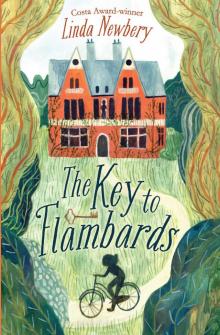 The Key to Flambards
The Key to Flambards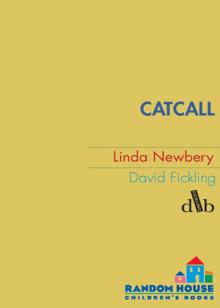 Catcall
Catcall Sisterland
Sisterland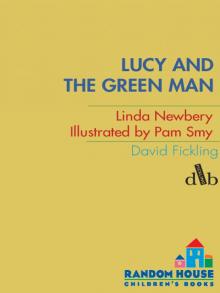 Lucy and the Green Man
Lucy and the Green Man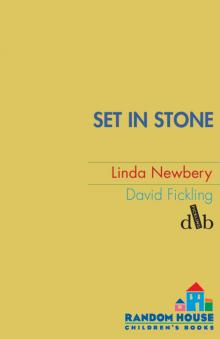 Set In Stone
Set In Stone Lob
Lob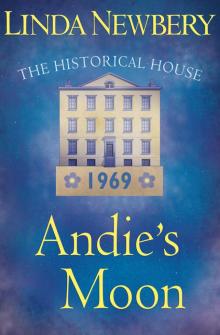 Andie's Moon
Andie's Moon The Shell House
The Shell House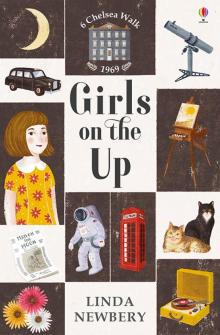 Girls on the Up
Girls on the Up The Sandfather
The Sandfather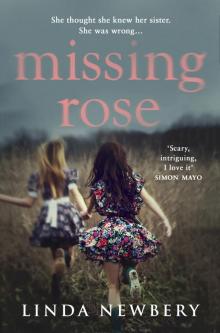 Missing Rose
Missing Rose Polly's March
Polly's March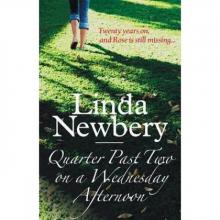 Quarter Past Two on a Wednesday Afternoon
Quarter Past Two on a Wednesday Afternoon Flightsend
Flightsend At the Firefly Gate
At the Firefly Gate